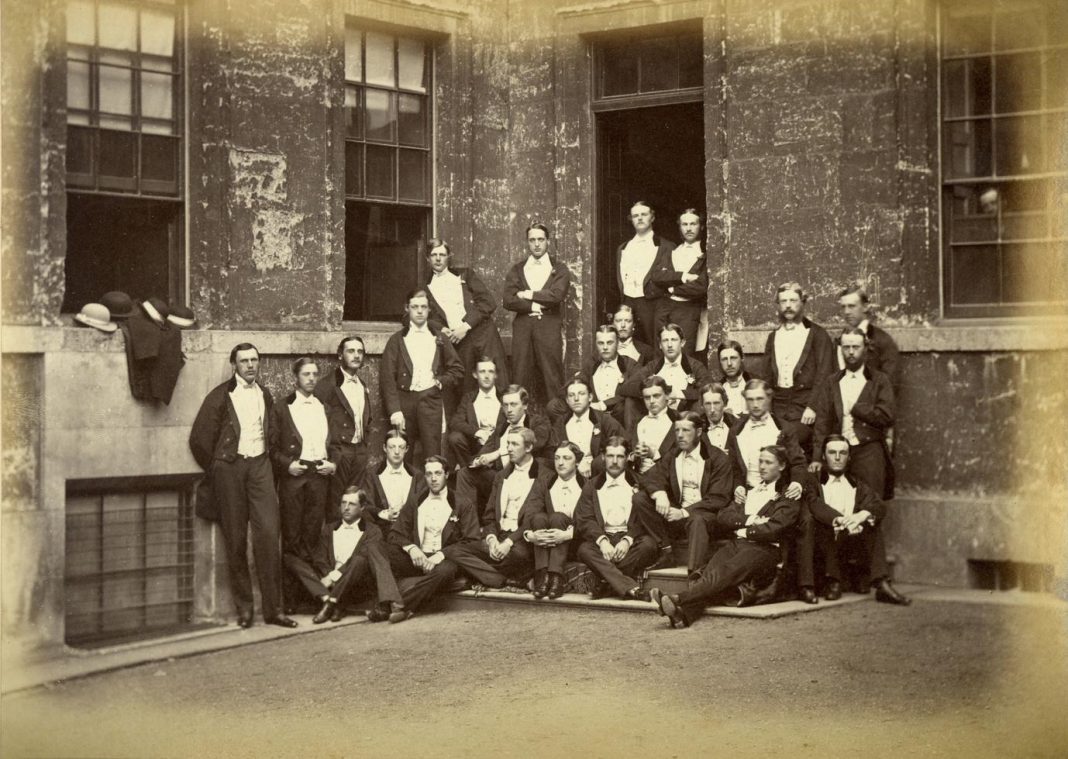Hedge Funds & Private Equity Chums – Is Oxford Ruining British Politics? Mike O’Sullivan Senior Contributor Opinions expressed by Forbes Contributors are their own. I cover the economic and financial world outside the USA, for the USA. May 21, 2022, 06:09am EDT | Share to Facebook Share to Twitter Share to Linkedin [UNVERIFIED CONTENT] Charles Cecil Cotes, the album compiler, is standing at far left. Standing at … [+] back in the corner with arms folded is Archibald Philip Primrose, the 5th Earl of Rosebery, who went on to become prime minister in 1894. Probably the richest prime minister. Flickr Vision Simon Kuper has another, good book out, called ‘Chums’ which explains how Oxford, and specifically its debating society the Oxford Union (as well as some related clubs like the Oxford Conservative Association) have created an eco-system that has funneled its members into a near monopoly of political power in the UK, and most dangerously of all has supplied the protagonists of Brexit. Part of Kuper’s argument is that the Oxford Union – a very good number of whose presidents (e.g .Johnson, Gove, Hague) have gone on to senior political roles – is a kindergarten for Westminster politics. Chums I picked up a copy of the book on Thursday. What made this purchase interesting was that I bought the book in Oxford, on my way to speak at the Union, but more about that later. An interesting and important theme that emerges is the labour market for politicians and the impact of this on decision making. When you see the manner in which the Oxford Union debating chamber resembles the set up at Westminster and indeed the way in which the Union building, like Westminster, offers bars, libraries and meeting rooms that could foster conspiratorial behaviour, it is no surprise that budding politicians are drawn to it as a forming ground, and in turn that the networks made there have such an impact at Westminster. In other countries, aspiring leaders follow channels also – notably Harvard, Georgetown and Yale Law in the US, and ENA (École Nationale d’Administration) in France. In many other countries – the US, Asia, Greece, Ireland and Spain for instance, families form the training ground for young politicians and seats are often passed through generations (a much less egalitarian approach). MORE FOR YOU The $30 Billion Kitty: Meet The Investor Who Made A Fortune On Pet Food Chairman Xi, China’s Looming Crisis, And The Myth Of Infallibility Meet Private Equity’s Quiet Corporate Turnaround Artist The outsized role that the Union plays in British politics betrays the fact that unlike other important professions such as the military, the Church and medicine there is no training for politicians – at least in the UK. France as mentioned has ENA which turns out well formed technocrats, and in the US the fluidity with which people can pass from professions (law, Wall St, public service, the army) into politics means that elected representatives come to politics with a good degree of experience. The tendency then is for the stereotyped Oxford educated politician to favour form (wit, speaking ability) over attention to detail, an approach that was evident through and beyond Brexit (though Olly Robbins the UK’s original negotiator was also an Oxford graduate). ENA One solution then would be a British ENA, and notably in the 1990’s I recall a group of left leaning Oxford academics (Roger Undy the labour economist for example) organizing courses in change management for the members of the future Blair cabinet, and to an extent the Blatnavik School at Oxford does this now. The idea of a school for politicians, at least in England, seems fanciful because the ethic of British politics is that policy is best left to civil servants and parliament is for entertainment. The flaw in this argument is that the civil service – from the Treasury to the Foreign Office – has been increasingly run down, denuded and bullied by politicians (Priti Patel and lately Jacob Rees Mogg). This produces a policy, ideas and implementation wasteland. The majority of university graduates who might have been attracted to the Treasury or Foreign Office see this, and instead opt to work in industry and this, rather than the lying and braying of the current Tory elite, is the real emerging structural flaw in the British system. Imran Khan Back to the Union. When I was a student at Oxford the Union was not quite my scene, though I remember seeing some memorable speakers there, like Lech Walesa and Imran Khan. This time, I was surprised at how young the students looked (its really that I am much older), and expect that they are a much more diverse, balanced and sensible group than the Union Committees of the 1980’s, but probably less entertaining at the same time. I enjoyed my evening at the Union, though disappointingly for someone who cares about the risks of ‘the end of globalisation’, our argument (Colin Yeo, Paul Donovan and myself) that ‘this House would abolish borders’ was rejected by the Union membership. As a cheeky end to my story of the Union, if you want an alternative, ribald view on what life at an Oxbridge college should be modelled on, then have a look at the tv series based on Tom Sharpe’s excellent ‘Porterhouse Blue’. Follow me on @levellingbook Mike O’Sullivan Editorial Standards Print Reprints & Permissions
From: forbes
URL: https://www.forbes.com/sites/mikeosullivan/2022/05/21/chumsis-oxford-ruining-british-politics/



